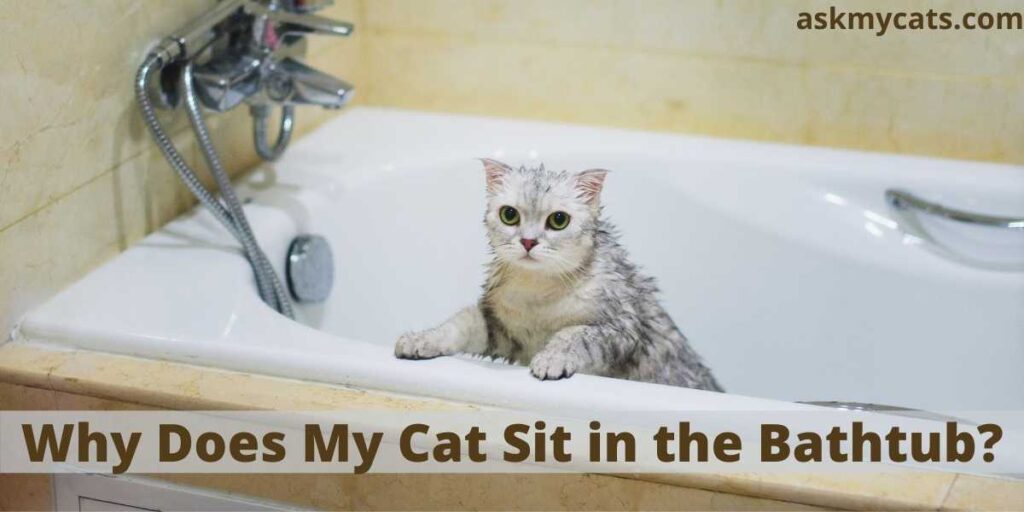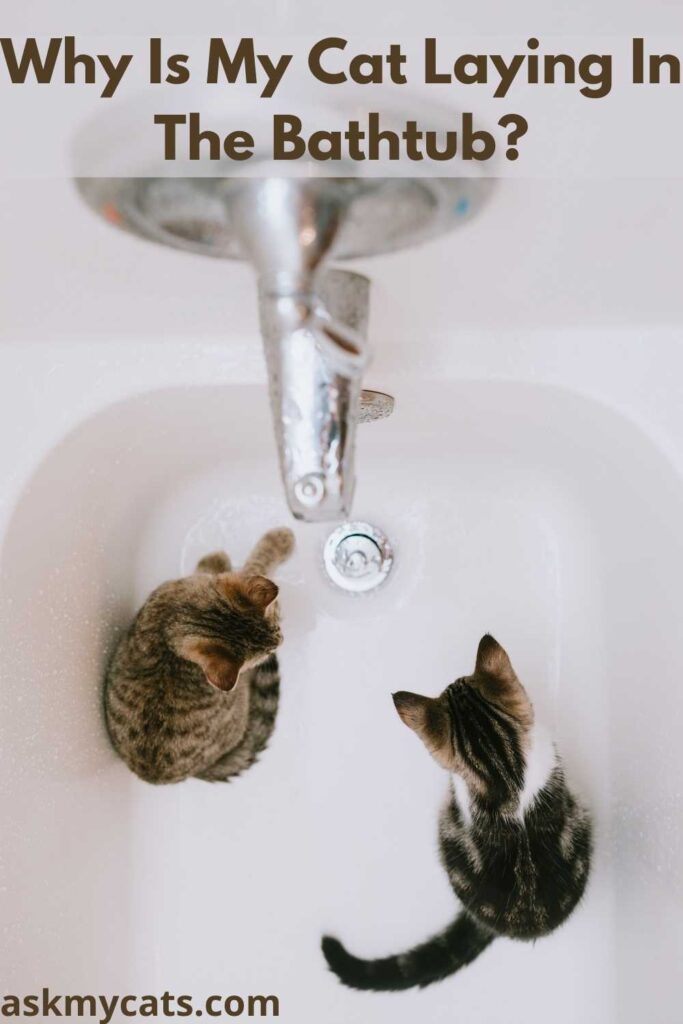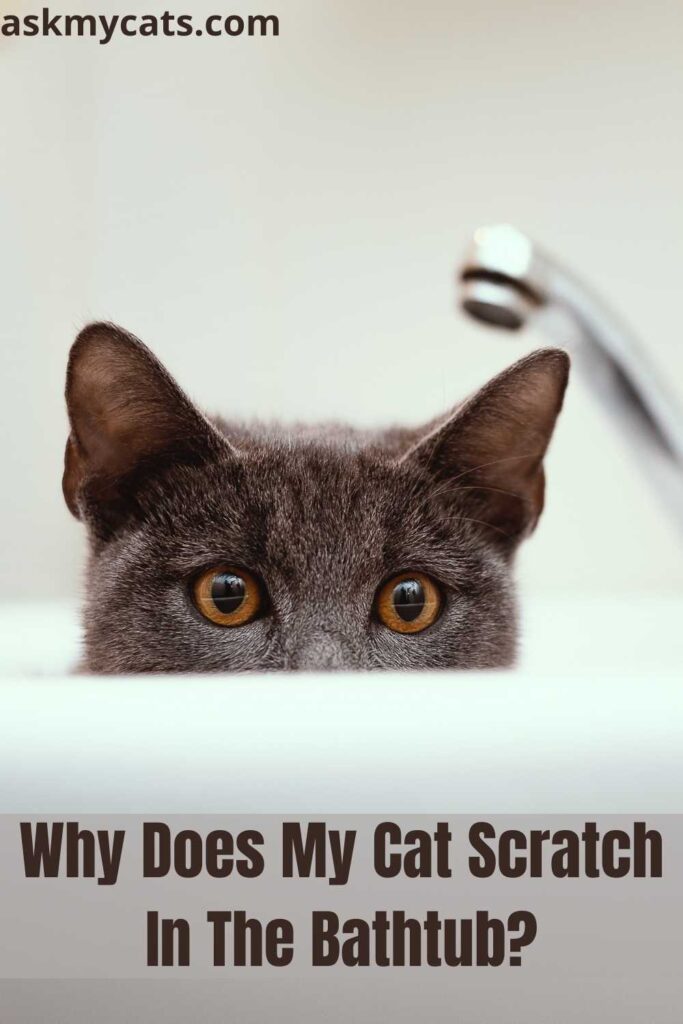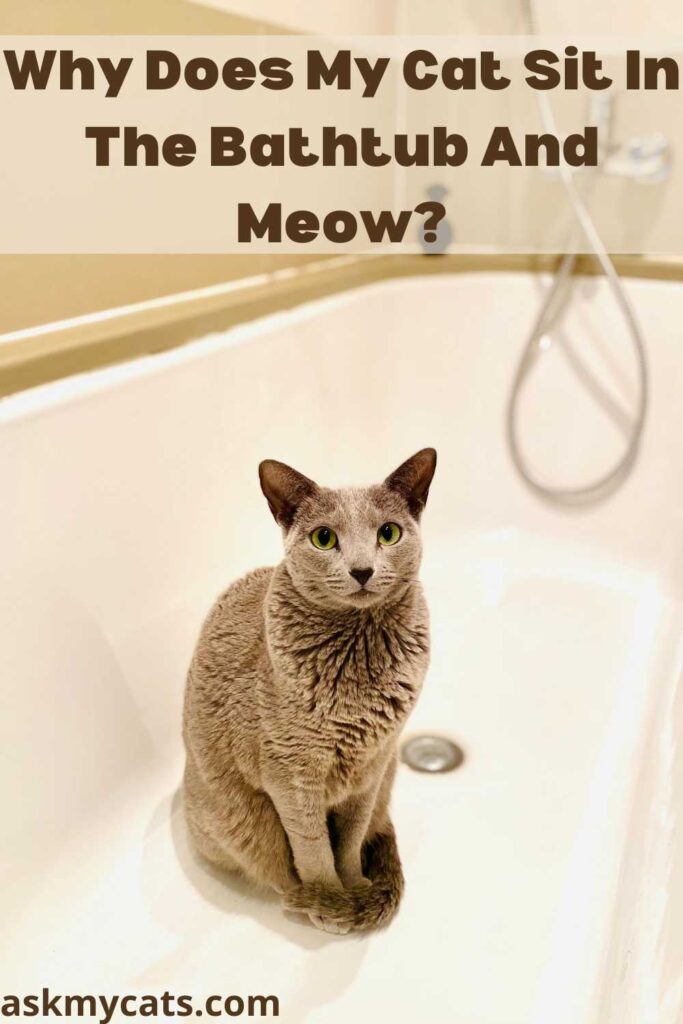If you know anything about cats, you know that they adore bathtubs. Do you let your cat into the bathtub with you? It may rub against your legs while you’re inside.
Maybe it jumps up on the counter and sits in the sink when you aren’t looking. It may make a loud meow and paw at the closed door.
When you’re in the bathroom, some cats seem to demand more attention than when you’re anyplace else in the house.
So, why does your cat sit in the bathtub?
A cat may sit in the bathtub if they are sick or hot and want to cool down, or cool and want to warm up after you’ve taken a bath, or be thirsty and know the bathtub is a water source.
Let’s take a closer look at the most prevalent reasons cats sit in the bathtub when to be concerned, and other possible circumstances.


Give Your Cat the Perfect Day
Get the Free Ebook!
Why Is My Cat Laying In The Bathtub?
Here are some reasons why your cat may be laying in the bathtub: –

1. Cat is Sick
Cats tend to separate themselves when they are sick.
Your sick cat might be napping in the bathtub since it’s a quiet, safe place for them.
They might enjoy the cool surface as well. If your cat is displaying any signs of illness and you keep finding them in the bathtub, take them to the clinic right away.
2. Cat Maybe Thirsty
Cats recognize the bathtub as a water source, and they may have developed the habit of licking the water out of it after they’ve finished bathing or showering.
They could be sitting in the bathtub because they went to check for fresh water and discovered none, and are now indicating to you that they’d want some.
Your cat’s thirst could be entirely normal, or it could indicate a health problem that necessitates a visit to the veterinarian.
When a cat gets used to getting fresh water from the faucet, it may go to the bathtub and wait for it to fill up.
If your cat has always enjoyed drinking from a sink tap, tub tap, or licking the water out of the tub after you shower, their behavior may be normal.
However, if they’ve always been content with water from their water dish (and you’ve been keeping it clean, fresh, and full) and suddenly demand water from the tap, it could indicate a health problem, such as kidney illness, hyperthyroidism, diabetes, and so on.
The cause of their increased water intake may only be determined by a veterinarian.
3. In Search Of A Safe Place
To your cat, the bathtub resembles a large box, and cats adore boxes. They can sit in the bathtub and face the room while keeping their backs safe (nothing can attack them from behind).
If you have other cats or pets in the house, your cat may be constantly assaulted, startled, or ambushed by another animal while trying to relax.
If your cat is elderly and you have a younger pet (or even small children) in the house, this notion may be much more valid. They may simply require some quiet time, which the bathtub offers.
4. Cat Is Hot
On sweltering summer days, I frequently found my cat sprawled in the bathtub. When cats are outside, they like to sleep in the soil because it keeps them cool.
They don’t have any natural options within the house, so they’ll seek out the coolest surface. It may be the bathtub or the tile flooring.
Their bodies feel cold in the porcelain tub. This theory may not apply if they are sitting in the bathtub rather than laying down.
5. Cat Is Cold
If your cat sits in the bathtub after you’ve taken a hot bath, it’s possible that they enjoy the warmth it provides.
When the dishwasher was running, our cat liked to sleep on the kitchen counter over it. He enjoyed the warmth of the counter.
Also, find out why is my cat peeing in the bathtub
Why Is My Old Cat Sleeping In The Bathtub?
The reason behind your old cat might be sleeping in the bathtub because he is not feeling well.
It’s likely that an elderly cat is sleeping in the bathtub because it’s a wonderful, quiet, cool, and safe place for them.
Unfortunately, it’s more likely that they’re sick, and that’s where they’d rather be when they pass.
When cats are sick or weak, they have natural impulses to stay away from the colony so they don’t attract predators. They frequently go to the house’s less frequented areas.
When they’re not feeling well, they generally prefer to be away from their owners so they may be alone.
When you think of how you felt when you had the illness, you probably wanted a quiet location in the house where you wouldn’t be disturbed and could rest.
The bathtub is not a popular hangout spot for people, so it’s an excellent place for a cat to rest.
Also, check out why does my cat wait for me outside the bathroom
Why Does My Cat Scratch In The Bathtub?
Your cat may be scratching in the bathtub to mark their territory, to be playful, or because they’re wanting to use it as a litter box.

Scent glands on cats’ paws are stimulated when they scratch and stretch, allowing them to leave their scent.
If you have other cats or pets in the house, or if you recently moved into a home with pets, it’s possible that your cat is trying to leave their scent to let other animals know that this is their territory.
If your cat scrapes the tub furiously with both paws, it’s more probable that they enjoy the smooth surface and are having fun.
It might be entertaining for them to run about aimlessly with their front paws.
It’s possible that your cat is scratching at the bathtub with one paw because they want to use it as a litter box, and their natural tendencies to dig are kicking in.
Check to see whether their behavior is comparable to when they’re in the litter box. Because some cats pee just down the drain, it’s possible that your cat is using the bathtub as a litter box without your knowledge.
In this instance, it’s critical to have your cat examined by a veterinarian, as litter box aversion could indicate a more serious health problem.
Why Does My Cat Sit In The Bathtub And Meow?
The reason why your cat is sitting in the bathtub and meowing could be for attention, because they’re crying for the tap to be turned on so they can have fresh water, or they may be in distress.

My friend used to have an older cat who would go downstairs, sit in the bathtub, and yowl.
It was a lot more resonant and throatier meow than his usual.
We are not sure why he chose the bathroom, but it could be due to the acoustics and his desire to be heard throughout the home.
After getting him to the veterinarian, he was diagnosed with kidney illness.
When your cat exhibits “abnormal” behavior, a visit to the veterinarian is always a good idea.
They can’t come out and say it hurts when they go to the bathroom, or that they’re now thirsty all the time, so they try to communicate with us in other ways. It’s possible that the meowing in the bathtub is them begging for aid.
If your cat has gotten a clean bill of health from the vet, think about whether they are meowing in the bathtub to catch your attention.
Cats crave human attention and will go to any length to obtain it. For attention, some cats may poop on the floor, while others will meow in the bathtub.
If you constantly come running into the bathroom while they’re meowing, pick them up and ask them what’s wrong, it’s possible that they enjoy how meowing in the bathtub immediately draws your attention.
You should never overlook a potential health condition or a distressed cat, but if you know your cat is healthy (as determined by a veterinarian), try ignoring the behavior and giving them extra attention outside of the bathroom.
They’ll quickly learn that meowing in the bathtub isn’t a good way to catch your attention.
Every cat owner believes they already give their cat enough attention. In a cat’s eyes, however, there is no such thing as too much love and care.
What’s the harm in giving them more? Cats are also fantastic at reducing our stress levels, so it’s a win-win situation!
To see whether it helps with the bathtub behavior, set out time throughout the day to play with your cat, pet them, brush them, talk to them, and give them one-on-one care.
Your cat could possibly be meowing in the bathtub because it needs to drink. It’s possible that they want you to turn on the bathtub tap so they can receive some fresh water if they like to drink from freshwater sources and poke their nose under the tap when you’re brushing your teeth.
Increased thirst and water intake can indicate a health problem such as renal disease or diabetes. If this is a new problem, make an appointment with your veterinarian and explain the situation.
When Should I Be Concerned About My Cat Getting Into The Bathtub?
Finding your cat in the bathtub is usually nothing to be concerned about. However, if your cat is elderly and typically avoids water, then suddenly appears under the shower spray, it could be an indication of dementia.
This could indicate that you need to see your veterinarian. If your cat is feeling sluggish and refusing to eat, she may be trying to cool off in the shower because she has a fever.
You can check her temperature with a rectal thermometer, which should be between 100- and 102 degrees Fahrenheit. If it’s higher, she’s got a fever and needs to see the vet right away.
If your cat has started using the bathtub as a large enameled litter box, she could be stressed out from new pets or family members. Perhaps you neglected to clean her litter box or moved it to an unfavorable location.
If you can’t figure out why your cat isn’t using the litter box, send him to the vet to be checked for a urinary tract infection or another sickness.
How To Keep Cat Out Of Bathtubs?
Here are a few tips to keep your cat out of the bathtub: –
1. Determine
To begin, figure out whether your cat is jumping into the tub out of curiosity or boredom. You can use a shower curtain to prevent your cat’s access to the bathtub if it is investigating its surroundings.
If your cat is leaping into the bathtub out of boredom, though, you must discover ways to keep your cat entertained.
Providing your cat with a scratching post or a collection of toy balls is one method to do this.
To keep your cat entertained, try hiding treats about the house. If your cat continues to jump into the bathtub, you may need to use a pet fence to keep him out.
Allowing your cat to drink or use the bathtub as a litter box is not a smart idea. If you want to provide your cat with fresh water throughout the day, you can buy a cat drinking fountain.
If your cat jumps into the bathtub, don’t yell at it, hit it, or spray it with water.
2. Access Denied
If your cat is curious and jumps into the bathtub, you can use a shower curtain to keep it out.
Cats are naturally interested, so if they can’t see what’s going on in the bathtub, they may be less likely to jump in.
If your cat is bored and leaping into the bathtub, you must discover ways to keep him entertained.
Providing your cat with a scratching post or a collection of toy balls is one method to do this. To keep your cat entertained, try hiding treats about the house.
3. Use Pet Gate
A pet gate is one technique to keep your cat out of the bathtub. This will prevent your cat from ever going into the bathroom.
A pet gate can also be used to restrict access in general. If your cat climbs on the counter, for example, you can install a pet gate in front of the bathroom door.
There are several different sorts of pet gates from which to pick. Plastic or aluminum pet gates are available for purchase.
Pet gates that are specifically built for cats or dogs are also available. If you have a huge cat, you may want to choose a pet gate that is taller than usual.
Frequently Asked Questions
Can I use aluminum foil to keep a cat out of a bathtub?
Yes, you can use aluminum foil to keep your cat out of a bathtub. Another item that cats dislike is aluminum foil. Roll up a few aluminum balls and place them on the commode lid, the tub ledge, the toilet paper roll, or anywhere else you want your cat to stay away from. This way, your cat won’t be able to access it and will gradually stop seeking it.
How to keep the cat away from toilet paper roll?
Fill a small paper cup, such as a Dixie cup, halfway with lukewarm water. Place it on top of your toilet paper roll with care. Make sure to choose a low-cost brand that you don’t mind getting wet a few times until your cat learns not to touch the roll. They’ll pick it up quickly. When your cat tries to play with the toilet paper, they are in for a major surprise when the Dixie cup of water spills on them. Cats don’t usually appreciate being surprised with water. The majority of cats dislike playing in the water unless there is a fish to catch.
Final Words
That’s all there is to it. Your cat could be lounging in the tub for a variety of reasons. If only we had the ability to read their inquiring brains.
We have no way of knowing for sure why cats enjoy lounging in bathtubs. There is no study that can provide evidence. We must rely on our observations and form our own conclusions.
Please post your questions in the comments area.
